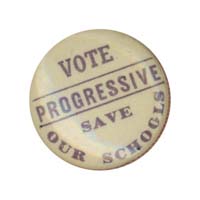
mccarthyism
During the 1950s, another wave of anti-communism known as McCarthyism affects
colleges and universities everywhere. Hundreds of professors loose their
jobs. In the early 1950s, the U.S. Senate’s Internal Security Subcommittee
resumes the work initiated by the Rapp-Coudert Committee at the city colleges.
In 1953, the NYC Board of Higher Education creates its own committee to
continue these investigations. By 1958, fifty-seven faculty and staff are
dismissed, resign under pressure, or retire because of these investigations.
Faculty and staff are either dismissed under Section 903 of the City Charter,
which makes it mandatory to cooperate with a government investigation, or
under the 1949 New York State Feinberg Law, which prevents members of the
Communist party from teaching in the public schools and colleges. The U.
S. Supreme Court declares these laws unconstitutional in 1967-68.
“McCarthyism assumed many forms and affected almost every aspect of
American life. While all the nation’s schools and universities were
hard hit, the City Colleges, as public institutions, were particularly vulnerable.
All four of then existing branches, Brooklyn College, City College, Hunter
College and Queens College, suffered.”
-- Professor Lawrence Kaplan, Introductory text to library exhibit at Queens
College on “McCarthyism at Queens College,” September 1-October
15, 2003.
 “Let it be declared the CCNY is actually the college which won the
Purple Heart for its front-rank and continuing battle against Communism.”
“Let it be declared the CCNY is actually the college which won the
Purple Heart for its front-rank and continuing battle against Communism.”
-- City College President Buell Gallagher
 In 1957, the Board of Higher Education dismisses Professor Warren Austin
, who had worked as an English professor at CCNY since 1931. Nineteen members
of his department write a letter to the Board in defense of his character,
to no avail.
In 1957, the Board of Higher Education dismisses Professor Warren Austin
, who had worked as an English professor at CCNY since 1931. Nineteen members
of his department write a letter to the Board in defense of his character,
to no avail.
 There is a general decline in campus activism at CCNY in the 1950s. All
student clubs are required to submit their membership lists to the college
administration. This regulation leads to a vast decline of political organizations
on campus because of fear that these lists would be turned over to the FBI.
There is a general decline in campus activism at CCNY in the 1950s. All
student clubs are required to submit their membership lists to the college
administration. This regulation leads to a vast decline of political organizations
on campus because of fear that these lists would be turned over to the FBI.
 Public college and university administrations throughout the country mandate
loyalty oaths for faculty members, fostering an atmosphere of fear on campus.
Public college and university administrations throughout the country mandate
loyalty oaths for faculty members, fostering an atmosphere of fear on campus.
 The generation of the 1950s is known as the “Silent Generation.”
The generation of the 1950s is known as the “Silent Generation.”





